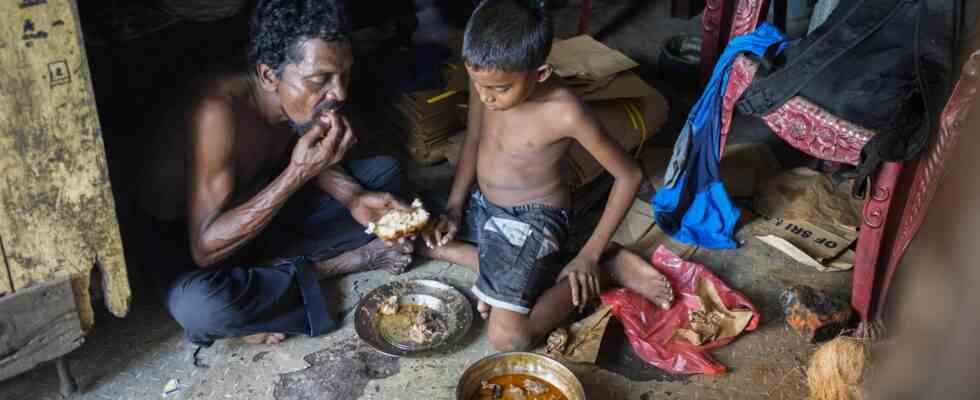Status: 03.12.2022 03:23
Sri Lanka is experiencing an economic crisis unprecedented in the country’s history. More than a third of the population now has hardly enough food. But international aid requires reforms.
14-year-old Kanisha Gopalakrishnan complains of pain in her feet and legs. Her mother eventually takes her to a doctor. The diagnosed vitamin deficiency: “He said I should eat good, nutritious food,” reports the girl. But the family in Sri Lanka has little money for that.
“We had the Covid pandemic. After that, the economic crisis broke out in our country. That’s why my husband lost his job,” explains the girl’s mother, Jeyakannika Subramaniam.
A little homework brings in some money. But the mother of three children only goes to the vegetable market in Sri Lanka’s capital Colombo every second or third week. The money is not enough for more.
Only rarely can the Subramaniam family afford to visit the market to buy fresh vegetables.
Image: ARD New Delhi
A fatal concatenation
Sri Lanka is experiencing the worst economic crisis since independence in 1948. The country lacks foreign exchange. Agricultural production declined after the abrupt ban on chemical fertilizers and the switch to pure organic production – mainly due to a lack of foreign exchange. The consequences were food shortages and a dramatic increase in the cost of living.
In addition, there were rising food prices on the world market. Food price inflation was more than 85 percent in October. The island nation of 22 million people is barely able to afford imports of food, fuel and medicines.
More and more people do not have enough to eat
According to the UN World Food Program, more than a third of Sri Lankan households (31.6 percent) barely have enough food. In 2019 it was only 9.1 percent.
About seven out of ten households regularly reduced the number of meals or smaller portions. 17 percent of children under the age of five are underdeveloped, 15 percent suffer from wasting, according to the UN organization.
A problem with the past
Sathivel Visvalingam, President of the aid organization FIAN in Sri Lanka, which is supported by the German aid organization “Brot für die Welt”, says that in addition to children, pregnant women are particularly affected by malnutrition. However, Sri Lanka has had a problem with malnutrition for years.
In order to help the families, his organization wants to create gardens so that the families can grow their own vegetables. But for that, the organization needs financial support.
debt and austerity
Sri Lanka defaulted on $51 billion in debt to international creditors in April 2022. In early September, the country agreed with the International Monetary Fund (IMF) on a four-year, $2.9 billion bailout package.
The first tranche of the bailout would alleviate foreign exchange shortages and free access to other funding, including from the World Bank and the Asian Development Bank, Human Rights Watch said in South Asia. But as long as the agreements with the IMF are not fulfilled, these banks could not provide new funds.
The government must therefore implement budgetary conditions and reform measures to stabilize the economy, explained Sri Lanka’s central bank head. Finance Minister Mahinda Siriwardene found that the first measures had ensured “a certain economic stability” – but had to be pushed further.
The political situation also remains unstable
The political future of the new President, Ranil Wickremesinghe, is likely to depend on the success of the reforms. His predecessor, Gotabaya Rajapaksa, resigned and fled the country in the summer after months of protests against the high cost of living and scarce resources for food and fuel.
Many demonstrators were disappointed that Wickremesinghe, of all people, succeeded him – they saw him above all as a long-time companion of the ousted president and also held him partly responsible for corruption and nepotism.
Wickremesinghe also cracked down on the demonstrations. He used the infamous Terrorism Prevention Act to arrest activists. And he threatened that if there were renewed protests, he would declare a state of emergency again.
Human Rights Watch has said that without respect for human rights, including the right to peaceful protest, the people of Sri Lanka cannot hold politicians to account. It is crucial that the country’s international partners put pressure on the government. “Respect for human rights is an essential step in overcoming the crisis.”
pressure on critics
In September, President Wickremesinghe introduced a draft so-called Rehabilitation Bill to Parliament. Human Rights Watch sees this as another attempt to intimidate critics. The law could also be used against anti-government protesters, whom the president described as “extremists.”
Tourists are slowly coming back to the island – despite the persistently severe economic crisis. “Tourism can play an important role in Sri Lanka’s economic recovery. That is our goal for the coming year,” said Sri Lanka’s Minister of Tourism, Harin Fernando.
At the same time, the government is calling on UN aid organizations to continue helping the people in need.

